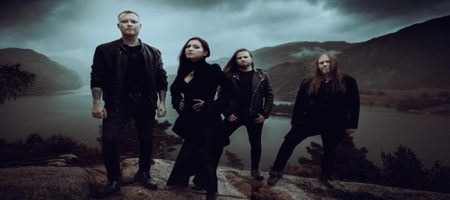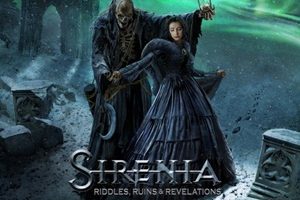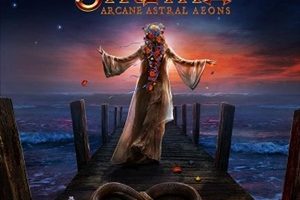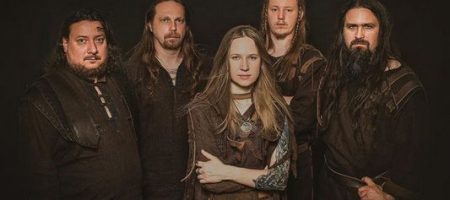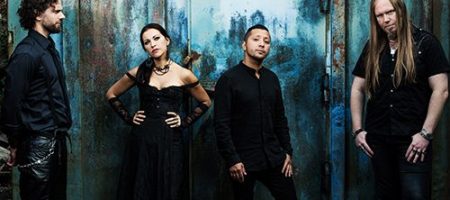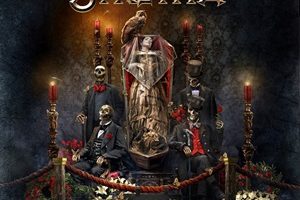Sirenia – Old Is New Again
Sunday, 10th May 2015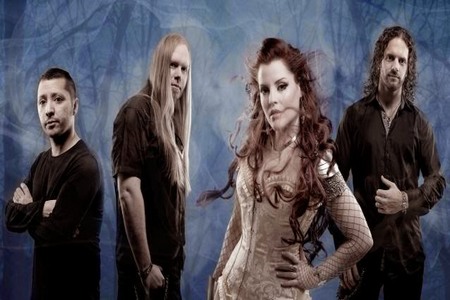
2015 brings the Norwegian gothic/symphonic metal act Sirenia to a comforting place as a band. Signing a new label deal with Napalm Records- the band’s original label for their first two albums At Sixes and Sevens (2002) and An Elixir for Existence (2004), their latest studio album The Seventh Life Path seeks to bridge a lot of the elements of the group’s beginnings with the melodic facets that have been explored on recent albums. Add in the occasional nuance of blast beats and brutal riffing, and you have the makings of a band that does not believe in stagnation – dynamic sonic exploration is ideal and mandatory in their world.
Guitarist, composer, producer, orchestrator – this is a short list of what leader Morten Veland brings to Sirenia. Seeking him out through Skype to chat about the new record, you will learn that the band is slowly establishing a fervent fan base, and have hopes to get over to our shores for some live performances as it’s been long overdue. Read on to learn more about the importance of stable band lineups, his view on videos as promotional tools for the group, as well as recharging his mental/physical state through a love of chess and nature.
Dead Rhetoric: The Seventh Life Path is the new Sirenia record. Tell us about the making of this record, at what point did the album title come to mind and were there any special difficulties or challenges that came about during the writing/recording process?
Morten Veland: I think I began writing material for this album approximately two years ago. You can say that writing and composing for me is an ongoing process, it doesn’t really stop but I guess it was at the time when we finished our previous album that I could give attention to this 100%. I just kept on writing, experimenting a bit to see where to go with this album. I feel personally that I have been seeking a little bit towards the past musically speaking, at the same time to come up with some new, untypical Sirenia stuff. And also some things that we have been working on more recently, it’s the process… quite long. We used to same way of putting together the album as we did on our previous record. Most of the material was recorded here in Norway in my own studio. I went to France for a few weeks to record the choirs and some acoustic stuff, at the end the album was mixed and mastered in Oslo.
Most of the recording process went quite smooth. We had a little bit of problems, Ailyn had an accident where she broke her foot in the middle of her sessions for recording the vocals. We had to postpone the recordings for a little while and she did the last remaining 3 songs sitting on a chair (laughs). That was a new experience for her and me as well. We managed to get through it in the end. We can smile a bit about it now, but we were stressed about it because it’s kind of tight with the deadlines. All of the recordings should be finished on time, we were nervous and luckily able to get through it.
The album title came quite late actually. I was thinking about it for a while, none of the titles for the songs on the album I thought would be suitable as an album title to sum up everything. This was our seventh studio album, so I went with something spinning around that as well.
Dead Rhetoric: I’d like to learn more about some of my favorite tracks on the new album: specifically “Serpent”, “Earendel”, and “The Silver Eye”…
Veland: “Serpent” is a really cool song, it’s driven by a massive guitar riff. I think it’s a typical song that has more or less every Sirenia ingredient in it: choirs, riffing, orchestral parts, all the different vocals (female and growling). It’s very powerful and dynamic, the atmosphere in the song switches more or less throughout the whole song. I thought it was a cool song to open the album with – of course up front there is an intro that blends together with the song towards the end of the intro. “Earendel” the song, I think that goes back to a bit what we were doing musically in the beginning of our career. To me it’s a bit of a nostalgic song, it brings me back to when we were recording our first albums, it’s cool to revisit the early days of Sirenia. A lot of the Sirenia fans that prefer the early Sirenia stuff will really like this song. “The Silver Eye” is also kind of hard and heavy song with blast beats and brutal. One of the heaviest songs we’ve done in our career. A lot of melodic guitar riffing, very energetic and mixed with Ailyn’s sweet vocals on top. I think that song is a mixture of old and new Sirenia in a way. Some of the riffs sound old school, others sound in the modern style of what we have been doing lately.
Dead Rhetoric: As one of the founding members of Tristiana, you recorded two albums with the band before social and personal differences came up for you to leave in 2000. What circumstances prompted this decision- and how quickly as a result did Sirenia develop?
Veland: Things happened really fast. We parted ways in January 2001, it only took a couple of weeks after we split up that I had Sirenia on its feet. At that point we were only 3 members and we hadn’t found our female singer at that point. We had a band name and we had new material- a few of the songs obviously came from material I had been writing for the next Tristiana album, but that never happened so I used that material for Sirenia and then I wrote newer songs. We entered the studio quite quickly, we were in there by the end of the year, November or December of 2001. We used a session female singer for that first album, and we found a permanent singer by the time we recorded our second album.
Dead Rhetoric: Within Sirenia on the recording front, you juggle many responsibilities in terms of songwriting and instrumentation – do you consider this a full-fledged band at this point or do you separate the studio work from the live performances?
Veland: Its two different worlds. I really like both of them. The creative part with working in the studio and composing, arranging songs, it’s something that I really have loved since the very beginning. A lot of musicians after a few days in the studio they get bored and want to go out on the road to play concerts. For me I spend my life in the studio, I really enjoy it. Especially at a point when we finish a new album, it’s been so much studio work I more or less feel drained. At that point it’s inspiring to go into the rehearsal space with the band and start playing the songs with everybody, travel out and present the material at live shows. Its two totally different worlds but I really love both of them.
Dead Rhetoric: Do you believe that the many singer changes during the early part of Sirenia’s career may have created difficulty in establishing credibility for the band?
Veland: I don’t know, maybe. That’s a difficult question to answer, but what I know is of course having an unstable lineup like that is really difficult. It’s taking away a lot of the focus from the music. We have to spend a lot of time on finding replacement members, and that’s really time demanding stuff. It takes a lot of work and pressure, you lose time and focus on what you need to do which is compose music, make shows, and all that. We’ve had a stable lineup now for quite some years and I really see the positive sides with having a stable lineup. It gives me much more time to focus on the things I should be focusing on.
Pages: 1 2











